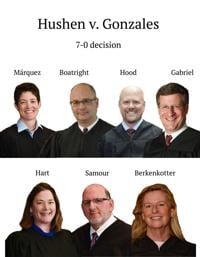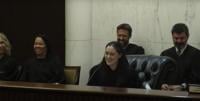Colorado justices: Witnesses cannot be sued for statements in campus sexual misconduct proceeding
The Colorado Supreme Court walked back a decision by the state’s second-highest court, concluding on Monday that witnesses in a school sexual misconduct investigation could not be held liable for defamatory statements even if the proceedings lacked key protections for the accused student’s rights.
Generally, what someone says during the course of judicial proceedings has “absolute privilege,” meaning their statements cannot form the basis of a lawsuit — even if they are knowing falsehoods. The same principle extends to statements in quasi-judicial proceedings, which can include investigations and adjudications that take place outside a courtroom.
Previously, the state’s Court of Appeals concluded a campus sexual misconduct investigation that lacks hallmarks of fairness and reliability is not a quasi-judicial proceeding. Therefore, it is possible to sue witnesses or victims for the untrue and damaging statements they may make.

But that is not correct, wrote Justice Melissa Hart, as a proceeding may still be quasi-judicial even if the people in charge run roughshod over the accused’s due process rights.
“Just as a judicial proceeding itself can be found inadequate due to a lack of due process, so can a quasi-judicial proceeding. In neither case do we say the proceeding loses its character as judicial or quasi-judicial,” she wrote in the June 9 opinion.
In the underlying case, Benjamin Gonzales was a student at Evergreen High School when two female classmates accused him of sexually harassing or touching them in 2018. The school performed an investigation pursuant to Title IX, a federal civil rights law, and Gonzales was expelled from school. Prosecutors in Jefferson County brought criminal charges against him for unlawful sexual contact, but a judge found him not guilty.
After the trial, Julie Hushen and Nicole Weary, the mothers of Gonzales’ accusers, allegedly sent emails to school personnel arguing against readmitting “this predator,” referring to their daughters as “victims” and claiming Gonzales had a “history of sexual assault.” Subsequently, the school district reopened its Title IX investigation into Gonzales.
Gonzales then sued his accusers and their mothers for defamation.
In 2023, a three-judge Court of Appeals panel agreed Gonzales’ claims should proceed. Among other things, the panel concluded the defendants’ statements were not shielded by absolute privilege, like a witness in a courtroom, because the Title IX process in Jeffco did not have the procedural safeguards characteristic of quasi-judicial proceedings.
“Although these procedures may seem adequate at first glance, we conclude that they are insufficient to ensure reliability and fundamental fairness, nor do they allow for adversarial testing of the facts,” wrote Judge Katharine E. Lum. “We question whether any tribunal could adequately assess credibility or perform a truth-seeking function under such circumstances.”

Judge Katharine E. Lum speaks at her ceremonial swearing-in to the Court of Appeals on April 28, 2023. From left to right are Judges Elizabeth L. Harris, Terry Fox, Karl L. Schock and Matthew D. Grove.
On appeal to the Supreme Court, the Colorado Department of Regulatory Agencies and Colorado Department of Early Childhood weighed in to caution the court about how its decision could broadly affect state quasi-judicial proceedings in which licenses are suspended or revoked.
“If complainants face the possibility of a defamation lawsuit following an administrative proceeding, they could hesitate to come forward, hampering investigations into conduct that violates professional standards and chilling the Departments’ missions to protect Colorado consumers, children, and families,” wrote the Colorado Attorney General’s Office.
In the Supreme Court’s opinion, Hart noted the school district had seemingly not “followed its own Title IX policies” during either phase of the misconduct investigation. However, Gonzales already sued the district in federal court with allegations of a deficient investigation — and settled the case.
“These are extremely important questions, but, again, they are different from those at issue in this case,” wrote Hart. Instead, the question was whether the district’s investigation was quasi-judicial. On that front, the answer was yes because the proceedings considered Gonzales’ rights by applying law or policy to the facts.

Justice Melissa Hart speaks during oral arguments at the Colorado Supreme Court’s “Courts in the Community” event on May 9, 2024 at Central High School in Pueblo. (Photo by Jerilee Bennett, The Gazette)
“Therefore, any statements made during the District’s Title IX proceeding are protected by absolute privilege and cannot be used as the basis for a civil lawsuit against the participant who made those statements,” Hart wrote. “The possibility that the proceeding did not comply with the District’s published grievance process has no bearing on whether the proceeding was quasi-judicial.”
She added that allowing the Title IX witnesses to be sued for their statements would “very likely” deter victims of misconduct from reporting in the first place.
“We endured public attacks on our names and reputations to help ensure future victims aren’t forced to relive trauma in court without legal safeguards. This outcome, while bringing relief, comes at a personal cost — damage was done without ever going to trial or presenting evidence,” the Hushen family said in a statement.
“We are grateful that the Supreme Court has reached the correct result and extended absolute protection from retaliatory lawsuits, like this one, to students and others who exercise their free speech rights in availing themselves of the protections of Title IX,” added the Wearys.
The attorney for Gonzales did not respond to a request for comment.
The case is Hushen et al. v. Gonzales.








